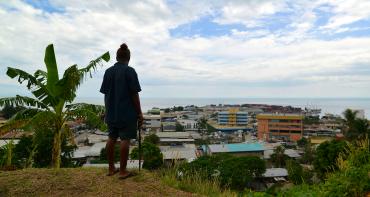Staged in partnership with the OECS and the Economic Commission for Latin America and the Caribbean (ECLAC), the workshop was held in St. Vincent and the Grenadines from 14 -16 November 2017.

Staged in partnership with the OECS and the Economic Commission for Latin America and the Caribbean (ECLAC), the workshop was held in St. Vincent and the Grenadines from 14 -16 November 2017.
ECLAC funded the participation of 32 officials, 17 men and 15 women, of whom 29 were from the public sector and three from the private sector. Participants were drawn from ministries or departments of trade and commerce, customs and excise and the national statistical offices of OECS member states; except for Dominica, which was unable to attend due to Hurricane Maria.
Mr Paul delivered the opening remarks and highlighted the substantial contribution of the Hub and Spokes Programme in enhancing the development of trade capacity in the OECS region since its inception 2005. The key note speech was delivered by the Sir Louis Straker, Deputy Prime Minister and Minister of Foreign Affairs, Trade and Commerce of St. Vincent and the Grenadines. The Hub and Spokes National Trade Adviser assigned to St. Vincent and the Grenadines also attended.
The following trade software packages were used as key elements of the training: Competitive Analysis of Nations (TradeCAN), Growth of International Commerce (MAGIC Plus) and World Integrated Trade System (WITS). Among other indicators, these packages are used to analyze trade performance, including evaluating market share, the technology intensity of exports, product specialization and competitiveness. These can assist trade experts, researchers and negotiators to better determine sectors and activities that are most competitive and offer most opportunity.
In its report on the workshop, ECLAC stated that exposure to tools for acquiring and analyzing trade data had the potential to positively impact trade-related decision-making and the formulation of public policy.
More importantly, participants themselves generally viewed the analysis and indicators presented as an asset to the work of their institutions and an aid towards improving the formulation and implementation of trade policy. They expressed an intention to implement and share their newly acquired knowledge. The RTA concurred with these findings.
Participants identified specific benefits from the workshop, including:
- Learning to access and interpret trade data. Exposure to statistical tools to aid in better trade policy analysis and formulation.
- Greater appreciation for the role of trade data and analysis tools on decision-making. Valuable exposure to TradeCAN, WITS, and Magic Plus as tools for accessing trade data between countries.
- Understanding new trade database and analysis tools, exchanging ideas and networking with experts in trade analysis.
- Application of models for competitiveness analyses. The hands-on training was useful in generating results to queries.
- Learning to use trade software tools and conducting analyses using these tools. Accessing trade databases and conducting analyses using TradeCAN, WITS, and MAGIC Plus to gauge country performance relative to the rest of the world.
Another advanced and comprehensive workshop is being planned in 2018 with the assistance of, and funding from, ECLAC, with technical assistance and support from the Hub and Spokes Programme.



